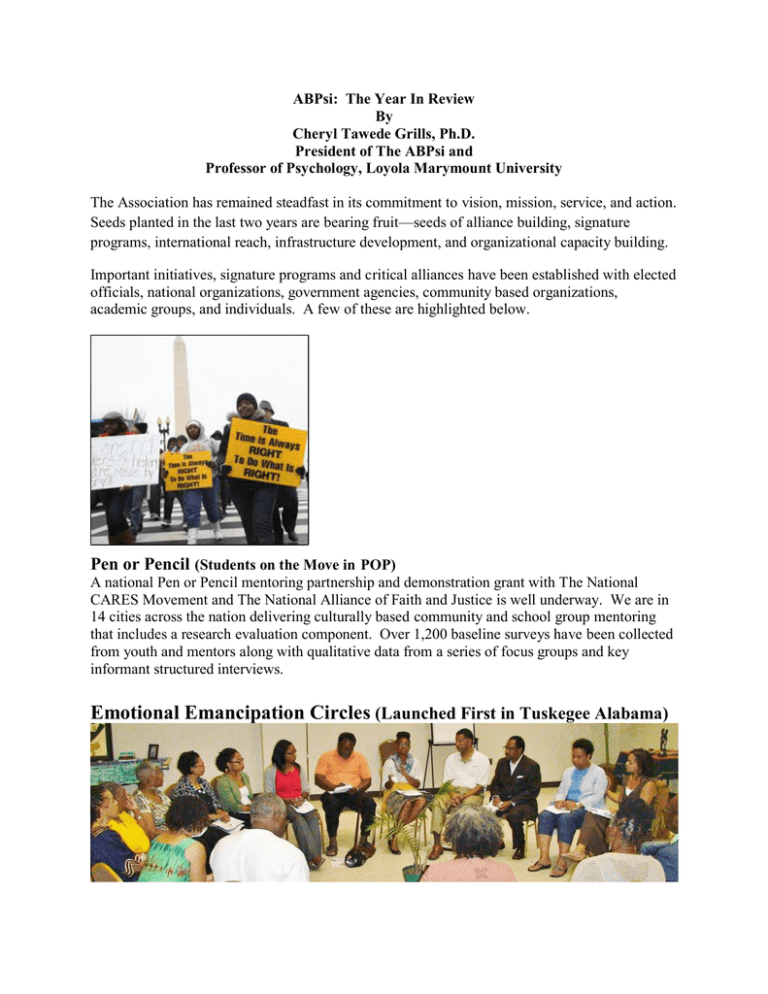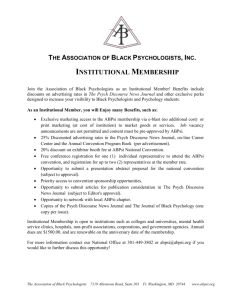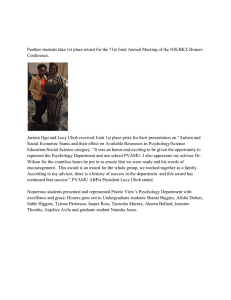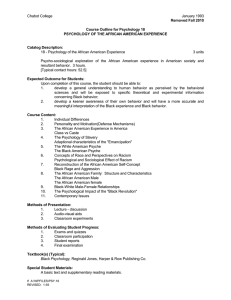Emotional Emancipation Circles
advertisement

ABPsi: The Year In Review By Cheryl Tawede Grills, Ph.D. President of The ABPsi and Professor of Psychology, Loyola Marymount University The Association has remained steadfast in its commitment to vision, mission, service, and action. Seeds planted in the last two years are bearing fruit—seeds of alliance building, signature programs, international reach, infrastructure development, and organizational capacity building. Important initiatives, signature programs and critical alliances have been established with elected officials, national organizations, government agencies, community based organizations, academic groups, and individuals. A few of these are highlighted below. Pen or Pencil (Students on the Move in POP) A national Pen or Pencil mentoring partnership and demonstration grant with The National CARES Movement and The National Alliance of Faith and Justice is well underway. We are in 14 cities across the nation delivering culturally based community and school group mentoring that includes a research evaluation component. Over 1,200 baseline surveys have been collected from youth and mentors along with qualitative data from a series of focus groups and key informant structured interviews. Emotional Emancipation Circles (Launched First in Tuskegee Alabama) ABPsi and the Community Healing Network (CHN) are working together to establish a global network of Emotional Emancipation (EE) Circles—self-help groups focused on emotional emancipation, healing, and wellness for Black people. Our national partnership with CHN launched in Tuskegee, AL—in collaboration with Mayor Omar Neal and key stakeholders in the city—is groundbreaking. In partnership with CHN, ABPsi developed the framework and model for implementation of “Emotional Emancipation Circles” (EECs). EECs are designed to help people of African ancestry in the US and throughout the diaspora to Defy the Lie of the Myth of Black Inferiority. We now have an EEC Toolkit, EEC Workbook, and EEC Training of Trainers curriculum developed by members of The ABPsi board, membership and CHN. A principal goal of EE Circles is to create the conditions for shared dialogue that lead to individual and collective emotional emancipation, healing, and wellness. This healing process is designed to break down the social and psychological fences that separate us. EE Circles lay the groundwork for a much-needed rebuilding of family and community relational ties and mutual support, and can pave the way to ending a host of social problems and disparities. EE Circles lay the foundation needed to deliver measurable positive outcomes, including increases in: 1. Cultural and emotional awareness and racial identity (with greater inoculation against the negative physical and psychological effects of racism and stress), 2. Appreciation of our place in history and our contribution to it, 3. Community support networks, 4. Sense of community and civic mindedness, 5. Resilience in youth and families and increased general well-being, 6. Peace of mind, heart and spirit, 7. An opportunity to exhale enlivened by the reality that the lie is just that—a lie—and that what lay ahead is what we envision and what we command into existence. 8. In the long term, the process of emotional emancipation can contribute to decreases in: Community detachment and stress; Crime; and Youth academic underachievement, loss of hope, and dreams deferred and more. The next phase of this initiative will be broadening the network of trained trainers and expanding the presence of EE Circles in ABPsi chapter cities across the country War on the War on Drugs st The Institute of the Black World 21 Century (IBW) has launched a national Drug Policy Reform Initiative to end the war on drugs and the derivative policing and criminal justice policies and practices that have disproportionately and adversely impacted Black Communities. Along with other national Black organizations, ABPsi has joined IBW’s national campaign to create a safe, humane and just system to address the issues of drug use and addiction in our society. The war on drugs has created a state of emergency in Black communities. As IBW terms it, the “war on drugs” is a war on Black people—from racial profiling to arrest, conviction, sentencing and incarceration – Black Communities have been disproportionately affected by punitive drug policies. ABPsi will participate in several strategies, at the local level and national level to reverse the negative trends and practices associated with the war on drugs including: Embracing affordable drug treatment as an alternative to incarceration and ‘harm reduction’ for substance abuse and addiction. Holding police and prosecutors accountable for racially disparate drug law enforcement. Advocating for reform policies that lead to disproportionate representation of people of color in the system. Seeking the repeal of civil sanctions attached to drug convictions and invest in restoring communities damaged by the “war on drugs.” I encourage ABPsi members to spread the word about and to attend IBW’s to attend THE INSTITUTE OF THE BLACK WORLD 21st CENTURY'S STATE OF THE BLACK WORLD CONFERENCE III--November 14-18, 2012 @ HOWARD UNIVERSITY!!!! THE ASSOCIATION OF BLACK PSYCHOLOGISTS Join Forces for a Common Cause In an historic move, ABPsi has joined forces with the American Psychological Association. Both organizations share a concern about the high prevalence of obesity and excess weight in African American girls and women and the impact that weight has on the quality of their lives, as well as the well-being of their families and communities. The alliance is formed around the issue entitled: “Let’s Join Together: Addressing the Obesity Epidemic in African American Women and Girls.” This ABPsi-APA joint initiative is a Call to Action for psychologists to address obesity in African American women and girls by bringing together psychologists with other concerned disciplines and community organizations. The obesity epidemic is a product of a complex array of social and environmental factors; its solution will require a multi-pronged interdisciplinary approach that involves community partners. This Call to Action will begin with a two day Summit in Washington DC in the fall of 2012 that will frame the issue and develop an action plan. Framing the issue will include epidemiological data on obesity in African American women and girls, health and mental health consequences, the multiple determinants of the epidemic, successful interventions as well as gaps in knowledge, and the role of psychologists as part of interdisciplinary and community partnerships. Invited to the table will be organizations such as the National Medical Association, the National Council of Negro Women, the Joint Center for Political and Economic Studies, and the National Association of Black Social Workers, PRAXIS, IBW, CHN, other national Black organizations, community organizations, foundations, and federal agencies doing work in this area, members of the Congressional Black Caucus, and those addressing relevant policy issues. The purpose of the summit is to develop an action agenda through which we all can independently and cooperatively work to better understand and more effectively address the prevention, treatment, and policy needs associated with weight control and support in African American girls and women. Throughout this process ABPsi has and will continue to maintain its organizational integrity and sovereignty. Expanding the Epistemology of Psychology The Black Graduate Student Conference in Psychology (BGCP) BGCP was started eighteen years ago by faculty and alumni in Psychology at The University of Michigan. Spearheaded by faculty at The University of Michigan, in the spring of 1995, seven faculty members from three institutions (Howard University, University of Michigan, and University of Illinois at Chicago) convened a meeting to support the scientific training and professional development of 20 of their African American graduate students. This meeting, held in Washington, DC, and sponsored by Howard University, was the inaugural BGCP. As a result, the BGCP has been held at a variety of institutions over the past 18 years. The convening has grown in the number of attendees and institutions involved—with more than 500 African American students from over 30 graduate programs participating to date. Many of them have gone on to become prolific and productive researchers and faculty at prominent universities across the country. Student participants have come from diverse areas of psychology, including cognitive, psychobiology, psychophysiology, social, personality, developmental, educational, clinical, counseling, organizational, and health psychology. In addition, nearly 30 different African American faculty members have participated. For the first time ever, ABPsi served as host of the BGCP, in Los Angeles at Loyola Marymount University with over 70 Black faculty and students in attendance from around the country. We were well represented by members of The ABPsi Student Circle and professional members of The ABPsi. The conference theme, selected by ABPsi, was “Expanding the epistemology of psychology: Taking control of the paradigm and increasing its relevance to the Black community.” California Reducing Disparities Project (CRDP) African American Population Report ABPsi collaborated with the African American Health Institute (AAHI) through a number of our members and in the form of our annual convention by co-locating major events, in the completion of a statewide mental health disparities study and report. With over 200 people in attendance, AAHI held a very successful CA statewide workshop, townhall, and press conference at the ABPsi convention, July 17, 2012, on the recently released CA Department of Mental Health Reducing Disparities Project African American Population Report. The report provides a blueprint for providing culturally grounded solutions for mental and behavioral issues in the African American population, created by people in our community. Results were shared from the historic initiative (The CRDP) commissioned by the California Department of Mental Health and funded by the Mental Health Services Act, Prop 63. Los Angeles County Department of Children and Family Services (DCFS) ABPsi collaborated with the LA County Department of Children and Family Services to offer a day filled with 15 sessions of intensive training for 100 county staff at the July 2012 44th Annual Convention as part of our pre-convention activities. The trainings were a resounding success in terms of their quality and relevance to LA County staff in their work with African American families. The evaluation outcome data is overwhelmingly positive which is reflected in the sampling of outcome data that follows.. In the Substance Abuse, Risk and Resilience workshop almost all attendees agreed or strongly agreed (N=40) that the trainers are knowledgeable (94%), material was presented clearly (92%), workshop was well-organized (92%), training covered useful information about cultural issues (94%), covered useful information relevant to their job activities (97%), and it increased their understanding of how to work with Black families (92%). In the Cross Cultural/Racial Communication Skills workshop, almost all attendees agreed or strongly agreed (N=29) that the trainers were knowledgeable (96%), material was presented clearly (96%), workshop was well-organized (92%), training covered useful information about cultural issues (96%), covered useful information relevant to their job activities (96%), and it increased their understanding of how to work with Black families (89%). In the Strengthening Relational Ties with AA Families & Communities workshop, almost all of the attendees agreed or strongly agreed (N=28) that: trainers were knowledgeable (93%), material was presented clearly (93%), workshop was well-organized (93%), it covered useful information about cultural issues (93%), it covered useful information relevant to their job activities (93%), and it increased their understanding of how to work with Black families (93%). In the Actualizing PEACE workshop almost all attendees agreed or strongly agreed (N=23) that: trainers were knowledgeable (95%), material was presented clearly (95%), workshop was wellorganized (95%), it covered useful info about cultural issues (95%) and information relevant to their job activities (95%), and increased their understanding of how to work with Black families (95%). Finally, in the African American Families in Domestic Violence/Homeless Shelters workshop all or almost all attendees agreed or strongly agreed (N=21) that: trainers were knowledgeable (100%), material was presented clearly (86%), workshop was well-organized (100%), covered useful info about cultural issues (95%) and information relevant to their job activities (100%), and increased their understanding of how to work with Black families (95%). We look forward to further collaboration to address issues of disproportionality in Child Welfare both in LA County and other parts of the country. California Institution for Women ABPsi continues its commitment to the California Institution for Women via its African Centered Reentry (ACRE) program. Over 500 women have gone through just one component of the ACRE model (Choice Theory training (CT) offered pro bono) due in large measure to the ongoing dedication of last year’s ABPsi Community Service Award recipients (Kyri Owens and Les Johnson – staff at the prison). Les and Kyri—on their own time—continue to offer Choice Theory training; and ABPsi and Loyola Marymount University Psychology Applied Research Center collect data to establish the evidence of the effectiveness of this intervention with women. Assessments have been completed on over 500 women showing noteworthy results (e.g., changes in depression symptoms, mindfulness, perceived stress, quality of relationships, and emotion regulation). Most astonishing, however, was the less than 3% recidivism rate among released women trained in CT. Given California’s recidivism rate that hovers between 68 and 70%, this is phenomenal. General Assembly Mid Year Meeting inTexas Our General Assembly has been exceptionally productive holding it’s annual mid-year assembly, preparing special member development sessions for the annual convening, and writing position papers and briefings on a host of topics. These papers include: POSITION PAPER Special Education- completed September of 2011 POLICY BRIEFS Special Education- completed September of 2011 Child Welfare- completed September of 2011 Evidence Based Practices- completed October of 2011 Adult Re-entry- completed November of 2011 COMMENTARIES NIH Commentary- completed September of 2011 Johns Hopkins Commentary- completed November of 2011 DSM V Formal Letter to the DSM V Task Force- June of 2012 At our 2012 convention Business Meeting the membership agreed to endorse a Death Penalty Resolution authored by member Dr. Matthew Johnson pending GA input. The resolution is included in this issue of Psych Discourse. On the International Front On the international front, The ABPsi presented at the Caribbean Psychology Conference and in July, 2012, ABPsi did an invited focal session at the International Conference of Psychology held in South Africa on the subject of African Centered Psychology and the Association’s history, mission, and trajectory of work. The ABPsi board and members presented to standing room only audiences at a number of presentations. Critical collaborations and networks were established with South African Psychology Professional organizations. These are just a sample of our efforts to bridge the disciplinary and organizational divide in the service of our communities. The JBP The Association’s signature journal, The Journal of Black Psychology, continues to be a well respected, highly referenced resource to the scholarly and practitioner community. Based on the most recent 2011 annual data from our publisher, Sage, the current circulation and readership total average is 8,185. Our 5 Year 2011 Impact Factor is strong at 1.47. The top cited article in 2011 was “A Meta-Study of Black Male Mental Health and Well-Being” (published in 2010). Our membership subscription has seen a 30.42% increase from 2011 to 2012 and total subscriptions in 2012 is 7514. The institutional geographic reach is quite extensive including 16% from the US, 21% from Africa, 27% from Europe, 14% from South America, and 13% from Asia/Southeast and Southwest Asia. Institutional Geographic Summary n = 8118 United States 16% Africa 21% Southwestern Asia 1% Southeast Asia 5% Asia 7% South America 14% Australasia 2% Canada & Mexico 2% Middle East 5% Europe 27% Institutional subscribers with the highest usage of JBP include: Addis Ababa University, University of Michigan, Columbia University, University of Texas Austin, Florida A&M, Temple University, and University of Chicago, Illinois. JBP is mobile! From July 2011 through July 1, 2012 there were 2,154 Apple iPad and Apple iPhone online usages of the journal. IN SUMMARY It has been a good year—we are living our mission. But we have more to do. Organizationally we are growing in our relevance, our visibility, our financial solvency, and our internal operations. We must continue to build our numbers in membership, the strength and numbers of our local chapters, and our fiscal fitness. We must continue to do the important work of theory development, research that expands the envelope for how we generate knowledge, and design of praxis that is consistent with our culture and worldview as people of African ancestry. In closing, much credit must go to the fantastic Board we have serving our beloved Association. I could not ask for a more collaborative, thoughtful, able group of people to share the awesome responsibility of shepherding the work of ABPsi, committed to protecting the integrity of its legacy and the advancement of its mission. To the ABPsi Board I say medasi pa pa pa (Thank you very much). To our Executive Director and Anisha Lewis and staff member, Alisa Jackson—words cannot describe how much your dedication and hard work is appreciated. You often go above and beyond—it is clear this is not a job…you are fulfilling a passion and a calling. We are so very appreciative that you have graced ABPsi with your talents, your spirits and your hearts. In Solidarity and Service, Cheryl Tawede Grills, Ph.D.




